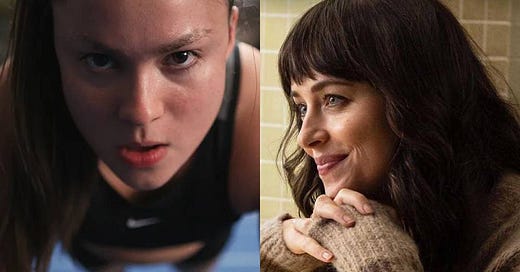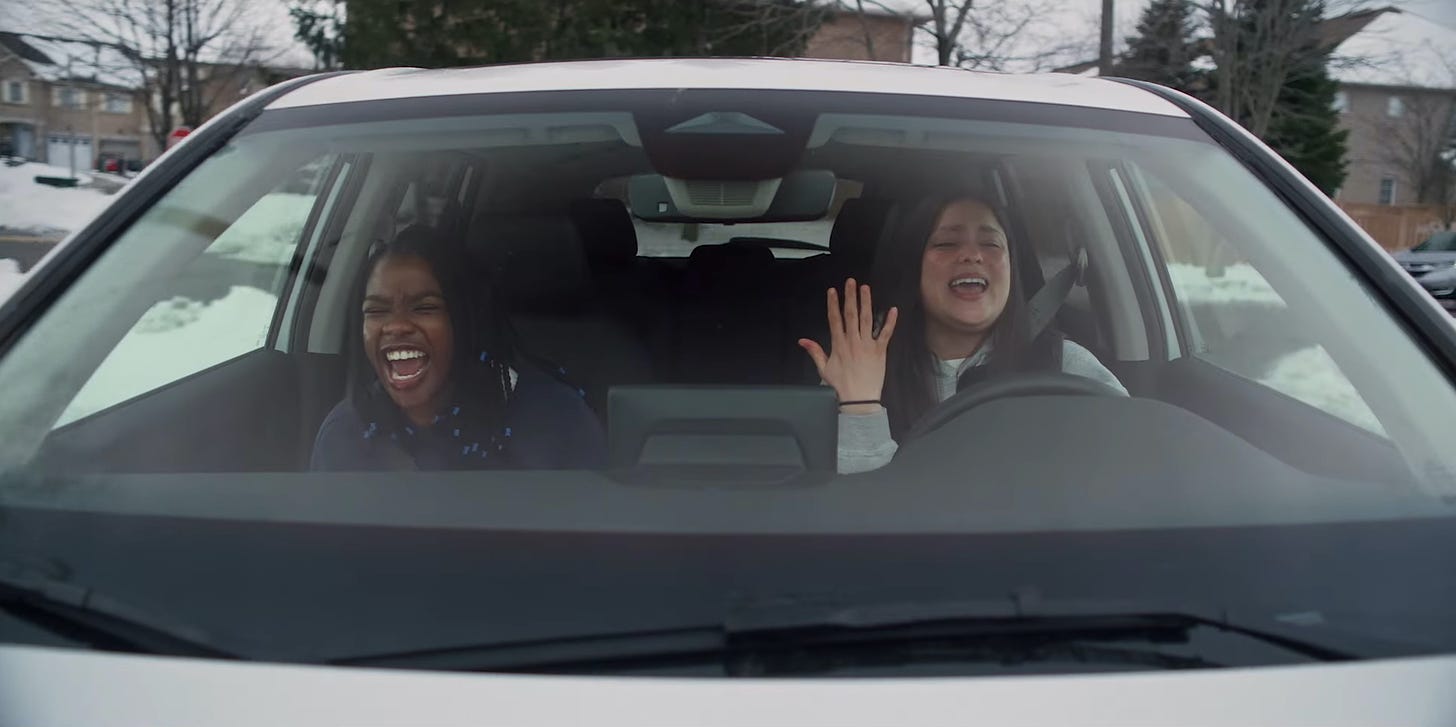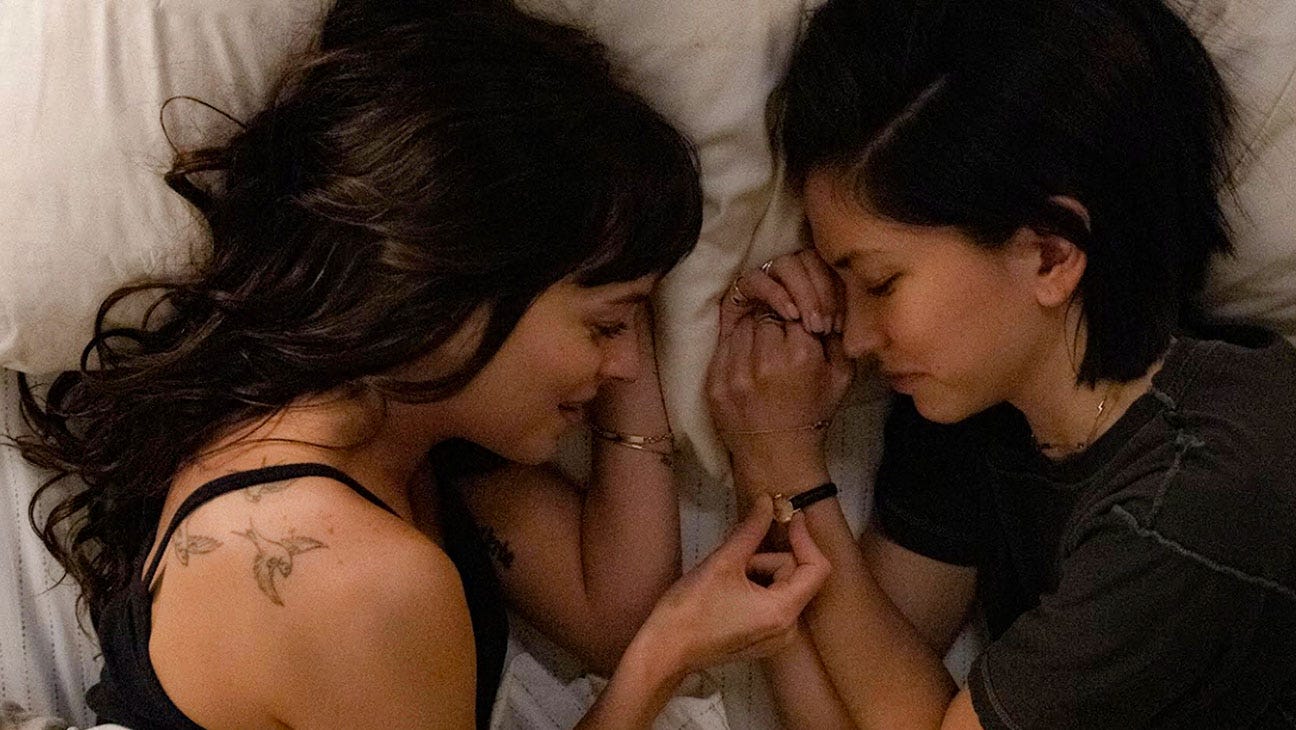This is the Sunday Edition of Paging Dr. Lesbian. If you like this type of thing, subscribe, and share it with your friends. Upgrade your subscription for more, including weekly dispatches from the lesbian internet, monthly playlists, and a free sticker. Support a lesbian for Pride!
Two new lesbian movies are streaming in June, so I decided to review them both in a single issue. Happy Pride Month!
Backspot
★★★★½
D. W. Waterson’s Backspot, which is available to rent now, announces an exciting new voice in queer cinema. Reservation Dogs’ Devery Jacobs plays Riley, a teenage cheerleader striving to be a champion in her sport. Along with two of her teammates, including her girlfriend, Amanda (Kudakwashe Rutendo), Riley is selected to join the Thunderhawks, an elite squad run by the demanding coach Eileen (Evan Rachel Wood). As Riley struggles to deal with the pressure, her anxiety worsens, putting a strain on her relationship with Amanda and jeopardizing her place on the team.
The lesbian cheerleader is not a new concept. As Kayla Kumari Upadhyaya writes in her piece in Autostraddle, “The Queerleader has long been an image used to both subvert and reinforce notions of girlhood and femininity.” But Backspot isn’t necessarily trying to subvert what it means to be a cheerleader nor what it means to be queer. Instead, these facets of Riley and Amanda’s identities just are.
Riley and Amanda’s relationship plays out with a lot of tenderness and affection. They sing-scream songs from the Legally Blonde musical on the way to cheer practice, they have dance parties after school, they fall asleep curled up under fairy lights. In one heart-clenchingly adorable moment, Amanda kisses the corner of Riley’s eyebrow, which she has pulled out as part of her anxious tick. Off the top of my head, I can’t think of another film that depicts a high school lesbian couple who are already together at the start of the movie – their relationship a living, breathing thing with history and routine. This is heartening to see in and of itself, and their relationship anchors the film’s emotional journey.
The other piece of the puzzle is Eileen, Riley’s new no-nonsense coach. Riley looks up to Eileen and wants to impress her, a situation recognizable to committed athletes or students, and especially to queer girls. When Riley and Amanda find out Eileen is also gay – she references an ex-wife – their reaction is ecstatic. They run out of the gym giggling and jumping up and down, another moment that will feel achingly familiar to anyone who’s ever been a queer adolescent looking for role models.
Eileen, however, may not be the best role model for Riley, and that’s one of the lessons Riley must learn on her coming-of-age journey. Eileen uses their shared identity to give Riley a piece of unsound advice, telling her to repress her emotions no matter what, something she believes queer folks in particular need to do in order to get ahead. It’s not until assistant coach Devon (Thomas Antony Olajide) reminds Riley that Eileen is a fallible human being, not a god, that she begins to recognize her own worth outside of Eileen’s approval.
Backspot was billed as a gritty sports drama, but it’s ultimately a sweet story about learning to trust yourself. It certainly has its Black Swan-esque moments – the eyebrow-picking, the vomit-inducing workouts – but the film isn’t interested in making Riley suffer for drama’s sake. Jacobs shines in the lead role, performing her character's physical and emotional feats with visceral intensity, yet still leaving room for her vulnerability. The movie includes some of the best montage work I’ve seen in recent memory, including an instantly iconic workout montage that will silence anyone who still thinks cheerleading isn’t a “real” sport.
The way Waterson, screenwriter Joanne Sarazen, and Jacobs, who was a producer on the film, make queerness a part of Backspot’s DNA is one of its most compelling elements. Riley and Amanda’s lives feel truly lived-in, and their relationship is constructed with care. It’s significant that they’re gay – and it’s also significant that Riley is an indigenous character – but it’s not an obstacle either of them struggles to overcome. Riley’s not battling homophobia, she’s battling her inner demons and the anxiety she’s inherited from her mother. This approach to populating a fictional world with queerness feels relatively novel, and there’s a freshness to Backspot that delights.
Am I Okay?
★★½
Unlike Backspot, Am I OK?, the feature directorial debut of Tig Notaro and Stephanie Allyne, adds little in the way of novelty to the existing lesbian film canon. Though Max acquired the rights to the film after it premiered at Sundance in January 2022, the company kept it in the vault for nearly two and a half years, releasing it on the platform earlier this month. Delaying the release of the film didn’t do it any favors, but the film would have felt dated even if it had premiered two years ago. As it stands, Am I OK? feels like it was trapped in the vault for 12 years rather than two.
Dakota Johnson plays Lucy, a 32-year-old woman living in Los Angeles. Lucy works as a receptionist but her true passion is painting, though she finds it difficult to feel passionate about anything as of late. Sonoya Mizuno plays her best friend Jane, a confident woman with a high-powered job and a serious boyfriend. When Lucy realizes she’s a lesbian, Jane encourages her to get out there and test the waters. Her co-worker Brittany (Kiersey Clemons) seems interested but is sending mixed singles, and Lucy’s existential crisis worsens when she discovers Jane is moving to London for work.
It’s not as if coming-out stories are no longer relevant. People still come out every day, and so-called “late bloomers” like Lucy often struggle to find their place in the community. The problem with Am I OK? is that we’ve seen this kind of movie before and it’s not even a particularly good version of this well-trodden story.
Most of the film’s issues come down to the writing. The characterizations lack any nuance or specificity, and the main points of conflict appear contrived. Lucy’s entire personality boils down to the fact that she’s weird and awkward – another overdone rom-com trope – and Jane’s downfall is supposedly her controlling nature, though we never see this play out with any real weight. Lucy and Jane have a blowout fight that acts as the climax of the second act, but it makes little sense why they’re fighting or why it’s so difficult for them to reconcile. Much of the plotting feels like a means to an end rather than an honest exploration of the characters.
The film also wastes two charming actors in roles that add little in the way of intrigue. The hilarious Molly Gordon plays Jane’s annoying coworker, but none of her jokes are funny. The eminently charming Kiersey Clemons plays Brittany, who teaches Lucy an unwanted lesson about not messing around with girls who have a boyfriend waiting on standby. Brittany’s dynamic with Lucy is purposefully confusing – Is she a manic pixie dream bisexual, or just straight? – but once again, the character feels more like a plot device than a real person.
More interesting than the film itself have been the reactions to it, and specifically the reactions to the reactions. Drew Burnett Gregory published a negative review of the film in Autostraddle, and a number of Autostraddle readers responded with unwarranted anger. Many in the comments section were incensed by the harshness of the review, and several comments were removed because they violated site policies.
This kind of conflict reflects a larger issue within contemporary movie culture today. If someone likes a movie, and especially if they feel seen or relate to it, criticisms of that movie can feel like a personal attack. This seems to be the crux of the debate over Am I OK?. Some viewers found that the film validated their experience as lesbians, whether it be the late-blooming aspect of the story or Lucy’s general angst and confusion.
What’s troubling is not that some people found the film relatable but that this resonance could (or should) preclude any need for criticism. Gregory wasn’t saying that anyone who related to the film doesn’t deserve to have their experiences depicted on the big screen, but rather that the film added nothing new to the conversation, neither narratively nor formally. Indeed, a film can be relatable without being good.
I’m certainly guilty of rating lesbian films on a different scale than non-lesbian films, and I’m more likely to be charitable towards a film if it has a few enjoyable gay moments. But we still need rigorous film criticism in order to make sense of the broader media landscape and to uplift cinema as an art form. Let people enjoy things? Absolutely! But let people not enjoy things, too. Being a hater can also mean demanding better.








"a film can be relatable without being good." yes!
damn the comments on that autostraddle article were a wild ride haha. really enjoyed reading these reviews and i'm excited to check out backspot!